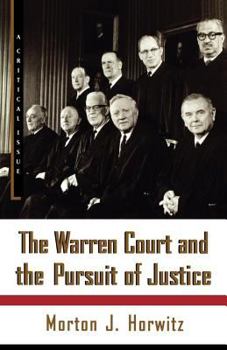The Warren Court and the Pursuit of Justice
(Part of the Critical Issue Series)
Select Format
Select Condition 
Book Overview
The Hill and Wang Critical Issues Series: concise, affordable works on pivotal topics in American history, society, and politics. The men who made up the Supreme Court when Earl Warren was Chief Justice (1953-69) changed America forever, and their decisions are still affecting constitutional law today. This overview of the Warren Court focuses on its landmark cases and enduring legacy.
Format:Paperback
Language:English
ISBN:0809016257
ISBN13:9780809016259
Release Date:April 1999
Publisher:Farrar, Strauss & Giroux-3pl
Length:144 Pages
Weight:0.42 lbs.
Dimensions:0.5" x 5.5" x 8.3"
Customer Reviews
4 ratings
Great
Published by Thriftbooks.com User , 16 years ago
A great introduction to the Warren Court. If you are looking research this era of the Supreme Court,this is surely the book to start at.
Honoring Our Best Traditions
Published by Thriftbooks.com User , 18 years ago
Throughout most of its history, the Supreme Court has been been dominated by the forces of private property and white privilege. The Court has tortured the plain language of the Constitution to accommodate Southern apartheid, to disenfranchise minorities, and to tolerate the repression of labor unions and socialists. Progressives who look to the Court to enlarge American democracy ignore the history of the institution. Instead, they seek inspiration from the anomalous Warren Court of the 1950s and '60s. This book explains why. "The Warren Court and the Pursuit of Justice" is a gem of popular legal history. It tells the story of how the Warren Court breathed life into the Constitution by ending school segregation, expanding freedom of speech, constitutionalizing state criminal justice systems, and requiring states to draw electoral districts on the principle of one man/one vote. Horwitz writes clearly and economically, and packs a great deal of legal, historical, and biographical material into a small space. His focus is not on technical legal doctrine. Instead, he aims to situate the Warren Court within the political and social history of the era, in the process offering the reader mini-essays on topics such as the civil rights movement and McCarthyism. His hero is William Brennan. His book is a total success. For honoring our best democratic traditions, the Warren Court was vilified by racists, McCarthyites, and Richard Nixon. As Horwitz observes, "Impeach Earl Warren" signs blossomed in the states of the Old Confederacy. This was telling. Conservatives may hate to admit it, but modern conservative court-bashing predates Roe v. Wade by many years. Its social and political roots can be traced to the massive extralegal resistance to desegregation in the South. To the extent a Court can be judged by its enemies, the Warren Court was on the side of the angels. That was long ago. The politics of the Supreme Court have undergone a seachange since the time of Earl Warren. No one should be surprised if the new Roberts Court pushes a conservative agenda that strengthens Presidents and prosecutors, while disempowering consumers, workers, and minorities. All the while, progressives will wring their hands and act as if the Court is betraying its traditions. In reality, it will be reverting to norm. Much will depend on who wins the White House and the Senate in 2008, for, as Horwtiz demonstrates, the bottomline is politics.
Wonderful Book
Published by Thriftbooks.com User , 22 years ago
I just took a class with Professor Horwitz of the same title here at Harvard, and this book clearly summarizes the major themes of the Warren Court. It is wonderfully written, moves very fast, but there are details given about this wonderful era of change.The book centers on the Warren Court's view of substantive democracy as a central organizing principle for the many decisions. It espouses the ideal that while responding to times, the Court also had higher ideals and used these two together.The book works through major case areas and is divided as such, looking first at the race relations and civil rights cases, then moving on to the response to McCarthyism with Free Speech, and views of Rights and Democracy. Each section builds on each other until Horwitz's great theme is revealed.It really gives the reader a great understanding of the Court, and one can come out of it feeling great. It works well with the course and would work very well on its own too.
An Accessible and Concise Look at the Warren Court
Published by Thriftbooks.com User , 25 years ago
Professor Horowitz provides a very accessible accounting of the Warren Court's impact on America and American jurisprudence. For those with legal training, this short history puts all the doctrines learned in law school-the void for vagueness application to the First Amendment, the Carolene Products Footnote Four analysis-into a tidy, compact context. For the non-lawyer, Horowitz avoids the legalese and shows how the Warren Court rulings affected the course of American events. Horowitz examines the court's impact in several areas: civil rights, democractic principles of governance, free speech, and the incorporation doctrine as applied to criminal procedure. Horowitz truly has admiration for his subject, but that admiration is not unqualified, and he takes the court to task for buckling under McCarthyism and for not standing up for its First Amendment principles, although Horowitz clearly blames one justice, Justice Frankfurter, for the court's reluctance to take on McCarthy. An excellent summary of the Warren Court, its decisions, and the justices who together made up its collective personality.





